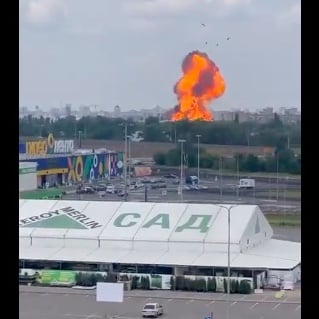Russian President Vladimir Putin, in a Saturday morning address, threatened to punish anyone involved in “armed rebellion” and accused them of treason.
His speech came hours after Wagner mercenary group chief Yevgeny Prigozhin claimed to have “blockaded” the Russian city of Rostov. Putin said he had given the “necessary orders” to the Russian regular military to retake the city with “decisive measures.”
On Friday, in a series of social media messages, Prigozhin had accused the Kremlin of misleading the Russian people about the justification for the invasion of Ukraine in February 2022, saying, “The evil borne by the country’s military leadership must be stopped.”
Denying—at least in the moment—that he was waging a military coup against Putin’s leadership, Prigozhin added that he had “25,000” followers who were on a “march for justice” into Rostov, near the Ukrainian front lines.
By Saturday morning, the mercenaries were moving in a convoy toward Moscow. Video on social media showed Wagner military vehicles bypassing Voronezh on their way to the capital city, “sweeping away everything in their path,” according to Anton Gerashchenko, advisor to Ukraine’s Minister of Internal Affairs.
“The fight is now on. This is now a civil war,” Michael McFaul, former U.S. Ambassador to Russia, stated on Twitter while retweeting video of what was reported to be “heavy fighting” in the Voronezh region between Wagner forces and the Russian Military and National Guard.
“The estimated time of approach to Moscow of the Wagner Column is 20-21 hours,” Gerashchenko posted on Twitter at 6:21am ET. It is unknown who is at the head of the column and whether the terrorist Prigozhin himself is in it.”
Yet even faced with rebellion, Putin in his speech still managed to point fingers at the West, calling Russia a hapless victim of the “economic and information machine of the West,” rather than acknowledging the consequences of his government’s own infighting.
There are “signs of cracks within Putin’s ruling elite. When you are losing the battle, the blame game begins. This is precisely what is happening in Russia today,” McFaul wrote.
Prigozhin, a former hot dog vender who became a billionaire, was known as “Putin’s Chef” for his close ties to the Russian President and his role as a caterer to the Kremlin. He had been making statements of escalating hostility toward the Kremlin for some time—particularly in recent months as his mercenaries came under brutal fighting in the Ukrainian city of Bakhmut.
In one video in early May, the Wagner leader stood amid dead bodies and in a tirade laden with expletives complained of ammunition shortages while saying his troops were “doomed to a senseless death.”
However, it now appears Prigozhin may have been stockpiling ammunition in anticipation of the current conflict.
Officials tell CNN that the White House has been monitoring the volatility between Putin and Prigozhin for months, determining as early as January that it was a full-blown power struggle. President Biden is being briefed on the ongoing situation, though as of Saturday morning he had not yet issued an official statement.
Ukrainian President Volodymyr Zelensky, however, has responded to the unrest inside Russia by saying, “Russia’s weakness is obvious. Full-scale weakness. And the longer Russia keeps its troops and mercenaries on our land, the more chaos, pain, and problems it will have for itself later.”
The chaos in Russia may also be an opportunity for Ukraine to step up attacks in its 16-month-long war.
“There will be distraction at that level and the Ukrainians will clearly be wanting to put the pressure on the Russians in a tactical sense,” said Mick Ryan, a retired major general in the Australian military and fellow for the Center for Strategic and International Studies. “So we’re going to see stepped-up attacks, or at least attempts to advance in the East and in the South from the Ukrainians if that’s not already occurring.”
PHOTO: Oil Depot explodes in Voronezh, Russia Saturday morning


